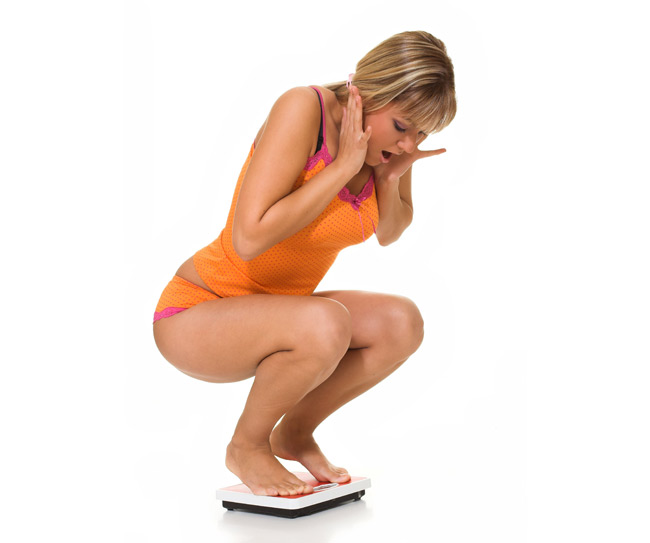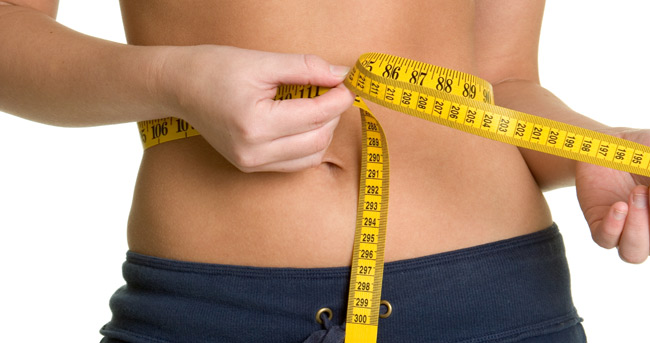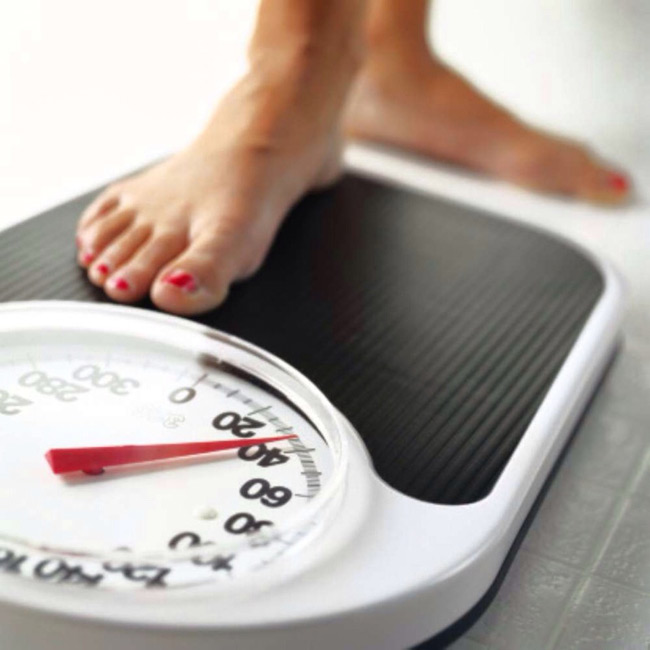Weight Gain during Premenstrual Syndrome

Women can gain from 2-10 pounds of excess weight during their
menstrual cycle. It is a fallacy to assume that all that weight gain
comes only from fluid and water retention. Many women who experience
weight gain during their menstrual cycle also experience food
cravings and most give in to them. This adds to the weight gain.
How long does this last? It is also a fallacy to say that the weight
gain takes place during the "period". In fact the weight gain takes
place during the first three stages of the menstrual cycle and
begins to be relieved during the bleeding "period". So let's take a
look at that menstrual cycle.
A woman's weight gain during her period is often part of the common
symptoms she experiences while having premenstrual syndrome (also
known as PMS). Experts at the Penn State's Milton S. Hershey Medical
Center state that up to three-quarters of women are affected by PMS,
and symptoms may appear 5-11 days before their period. Other
symptoms of PMS include bloating, abdominal cramps, and
irritability.
Weight gain during a period is usually due to water retention in the
tissues. Although it is not a serious condition, women may be
alarmed that they can gain a few pounds, ranging from one to six
pounds. Others can gain as much as ten pounds, even if they feel
that they have not done anything to increase their weight.
You've been exercising and eating healthy, but the scale just threw
you a curveball, clocking in at five more pounds than last week.
Don't worry-if your shocking weigh-in lands the week before your
period, you can chalk it up to water weight, reassures Raquel Dardik,
M.D., gynecologist at NYU Langone Medical Center. "Weight gain
happens five days before your period, but you'll be back to normal
once you start," she explains.
Pre-period water weight can range from half of a pound to 10 pounds,
usually averaging around five for most women, Dardik explains. Why?
The hormone progesterone-essential in the early stages of
pregnancy-is to blame: when there's no baby (aka when you get your
period), these levels fall. As a side effect, each cell in your body
retains an extra microscopic drop of water, Dardik explains.
While it doesn't lead to weight change, bloating caused by gas can
magnify the situation by making you feel a size bigger. Before you
ask, yes, you can figure out exactly how much weight gain is to
blame on your monthly visitor, but it's better to not focus on
numbers. Instead, maintain a healthy scale schedule to keep yourself
in check: weigh yourself once a week, on the same day, at the same
time, using the same scale. "The main thing is not to overdo it,
because fluctuations in weight are common," Dardik says.
Combat these side effects the way you battle all bulge: with
exercise. And drink a lot of water to help get rid of water
retention, says Dardik. Also try and avoid fatty foods, alcohol, and
salt, which triggers your body to hold onto water, says Dardik.
That extra weight that doesn't disappear after your period, though?
This could be caused by pre-period cravings that make you hungry for
salty, greasy foods, and sweets-and that kind of weight will not
come off after your period, Dardik warns. So before you indulge
simply because you're PMSing, think about whether you want to be
carrying that extra weight post-period.

Moral of the story: check your weight, but don't be paranoid about
it. And keep your chin up: Your best days are ahead of you, explains
Dardik, as women usually feel at their peak in the first 7-10 days
after their period.
Menstrual Cycle
Premenstrual Stage - This stage occurs about two weeks before
the bleeding period starts. Many of the symptoms of pms begin in
this stage but they are minor and grow more severe in the next two
stages.
Follicular Stage - This stage takes place about a week and half
before the bleeding period starts. It is in this stage that estrogen
floods the body and the uterine lining begins to thicken in
preparation for a fertilized egg. Bloating begins in this stage.
Bloating is a digestive issue and if bowel movements are impeded and
the woman is constipated. Then gas is formed in the digestive system
and causes bloating. Ovulation begins at the end of this stage.
Luteal Stage - This stage is about a week or 5 days before the
bleeding period starts. The eggs are released into the fallopian
tubes during this stage and the hormone estrogen no longer floods
the system. It has been replaced by progesterone and the bloating
begins to subside here.
Period - This is the time of actually bleeding or shedding of
the excessive uterine lining, excessive water, unfertilized eggs and
blood. This stage only happens if the woman does not become pregnant
at any time in the cycle. With the beginning of the period and the
shedding of all the excesses, the issue of weight gain dissipates as
well.
Post Menstrual Stage - This is a period from end of bleeding for
a week or two. Many women have symptoms at this time that are
identical to pms despite the cycle being complete. Weight gain can
start all over again in this stage.
Symptoms and Causes of Menstruation Weight Gain
For a lot of women this weight gain can be pre-period (before),
during and after (post period) the period stage of their cycle. It
often starts with bloating prior to the weight gain. As we know from
looking at the menstrual cycle, this bloating comes from gas trapped
in the digestive system and from constipation in the first three
stages of the menstrual cycle.
For the most part this normal weight gain takes place as a part of
premenstrual syndrome. This does not mean that it takes place during
the premenstrual stage. Pms can occur and usually does through the
first stages of the cycle until bleeding or the "period' begins and
it lets up. This means that weight gain can occur in the
premenstrual stage, the follicular and luteal stage.
So does everyone gain weight during their cycle? If not why not?
There are at least four specific reasons for excessive weight gain
during the cycle. Let's look at those. They include fluid retention,
food cravings, bloating and low magnesium.

Causes of Weight Gain during your Cycle
Fluid Retention: Also known as water retention, this is one if not
the primary reason for weight gain during the menstrual cycle. It is
certainly the first thing most people think of as the reason for
this weight gain. During the menstrual cycle, the hormonal changes
and imbalance caused by first flooding the body with estrogen and
next flooding it with progesterone that greatly reduced the estrogen.
This is followed by a drop in progesterone.
Another reason for this water retention can be the difficulty with
bowel movements that some women experience during pms. The issue
with bowel movements is also tied to the issue of bloat. According
to a study done on fluid retention during menstruation:
"We report menstrual and mid-cycle patterns of self-reported "fluid
retention" in 765 menstrual cycles in 62 healthy women.
Self-reported "fluid retention," commonly described as bloating, is
one element of the clinical assessment and diagnosis of premenstrual
symptoms.
These daily diary data were collected as part of an observational
prospective one-year study of bone changes in healthy women of
differing exercise characteristics. Ovulation was documented by
quantitative basal temperature analysis, and serum estradiol and
progesterone levels were available from initial and final cycles.
Fluid retention scores (on a 0-4 scale) peaked on the first day of
menstrual flow (mean +- SE: 0.9 +- 0.1), were lowest during the
mid-follicular period, and gradually increased from 0.22 +- 0.05 to
0.50 +- 0.09 over the 11 days surrounding ovulation.
Mid-cycle, but not premenstrual, fluid scores tended to be lower in
anovulatory cycles (ANOVA P = 0.065), and scores were higher around
menstruation than at midcycle (P < 0.0001). Neither estradiol nor
progesterone levels were significantly associated with fluid
retention scores. The peak day of average fluid retention was the
first day of flow.
There were no significant differences in women's self-perceived
fluid retention between ovulatory and anovulatory cycles." (Obstet
Gynecol Int. 2011; 2011: 138451. Published online 2011 August 8. doi:
10.1155/2011/138451PMCID: PMC3154522 Fluid Retention over the
Menstrual Cycle: 1-Year Data from the Prospective Ovulation Cohort
Colin P. White, 1 Christine L. Hitchcock, 2 Yvette M. Vigna, 2 and
Jerilynn C. Prior 2 ,*
Food Cravings
For many women their glucose readings and messages to the brain are
not accurate during the menstrual cycle. For this reason women find
themselves craving certain foods and overeating others to cause this
weight gain. These food cravings seem to go away as fast as they
came. There is also an increase in the women's metabolism during
this time that can cause the food cravings as well.
Bloating
As mentioned previously, bloat is caused by gas that gets trapped in
the intestines and causes abdominal distention and discomfort. This
bloat goes away with the start of the woman's period. It can be
caused by constipation as well.
Low Magnesium
Magnesium levels in the body seem to drop during the premenstrual
stage. This in returns means the body produces less insulin. Less
insulin means sugar cravings which mean over eating and weight gain.

What If I'm on a Diet?
This whole experience of weight gain during your period can be an
extremely frustrating process when you are on a diet. No one wants
to gain weight without explanation while dieting. However this
weight gain is short lived and nothing to worry about in respect to
your diet. You will be back on track very quickly.
Treatment for Weight Gain during Period
Weight gain during a woman's period is often transient, but it may
be a cause of concern especially for those who are trying to reduce
their weight. Here are some ways to control weight gain during
periods.
Regulate Hormones. Hormonal fluctuation during the menstrual cycle
can affect the levels of serotonin (a neurotransmitter) in the
brain. Studies suggest that serotonin levels can influence
depression and can lead to increases in appetite during a menstrual
period. Consult a doctor about the use of birth control pills to
regulate your hormonal levels, which may help relieve PMS symptoms
including water retention and bloating.
Dietary Modification. Water retention often leads to weight gain. To
avoid this, experts recommend limiting one's salt intake before and
during the period. This means avoiding processed foods and junk food
that contain large amounts of salt. Instead, eat more whole grains,
fruits, vegetables, unsalted nuts and low-salt foods. Limit your
caffeine and alcohol consumption and stick to drinking 8-10 glasses
of water daily.
Exercise. Being physically active during your period helps reduce
the symptoms of premenstrual syndrome. Exercising also relieves
stress, prevents depression, and reduces your appetite. Severe
cramps may be limiting, but these can be reduced by doing some
simple stretching such as those used in yoga or tai chi. Swimming is
another good exercise, which increases metabolism without
overexertion.
Take Medications. Over-the-counter pain medications like paracetamol
or ibuprofen can help relieve painful cramps and uterine swelling.
Ask your doctor to prescribe stronger pain relievers if ibuprofen
does not provide adequate relief. You can also ask for a
prescription for a diuretic to reduce excessive water retention.
Period Vitamins, Herbal, Natural and Supplements
You may want to use a diuretic and you can use a prescription or a
natural herbal remedy. Over the counter medications like Pamprin and
Midol also contained diuretics .
Calcium is a major player in several types of pms symptoms and
certainly it is in this one. Make sure you are getting enough
calcium.
Magnesium was addressed previously as seriously effective fluid
retention during pms.
Vitamins
Vitamin B6 is recommended in doses of 100 to 200 mg per day to
counteract pms symptoms including weight gain. This is because
vitamin B6 reduces the amount of estrogen in the blood and increases
the amount of progesterone. This leads to a better hormonal balance
and that can affect a few of the major causes of weight gain during
menstruation.

Lifestyle
Avoid salt and sodium as it will help with water retention. Avoid
caffeine as it will add to tension and food cravings. Avoid alcohol.
Warm water with lime juice might be used to reduce fluid retention
as it has been proven to do so. Exercise can prevent, stop and get
rid of any excess weight gain due to pms. Eat a diet that is made up
of lean proteins, vegetables and complex carbohydrates, along with
Omega 3 fatty acids. Stay hydrated. It may seem counter intuitive to
say drink a lot of water when water retention is one of the prime
reasons for this weight gain. But in fact the opposite is actually
true.
The more water you drink the more you will pass through in
urination.
In conclusion it is very common for women to experience weight gain
before, during and after their period and this can be several
pounds. There are however very simple ways to rectify this and
alleviate the excess weight.
Keep in mind that every woman (and every cycle) is different. If
you're taking birth control pills, hormone prescriptions or
fertility drugs, some of these weight changes may be magnified
(others may be muted). Just take stock of how your body reacts
throughout your cycle so you're in tune with what's "normal" for
you. And don't sweat a few extra pounds. Chances are, they'll
disappear after a few days (no matter where you are in your cycle).
Women Fitness hopes that the above resource shall go a long way in
providing deep insight into weight gain during premenstrual syndrome
(also known as PMS).
Videos
